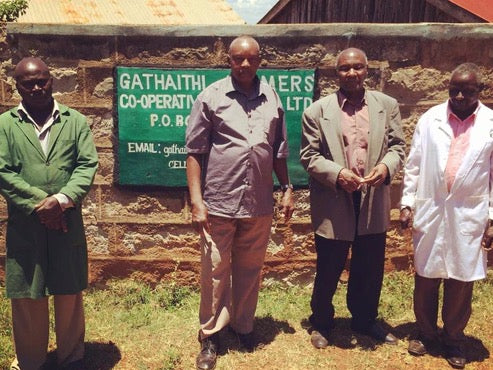
AA GATHAITI / KENYA
AA Gathaiti / Kenya
Flavor Profile:
Raspberry, Nectarine, Rhubarb jam, Hibiscus tea.
Fruity flavors of raspberry and nectarine, sweetness like rhubarb jam, and the flavor of hibiscus tea.
- Country of Origin: Kenya
- Refinery: Gathaiti Factory
- Producers' Association: Gathaiti Farmers Cooperatibe Society
In the text, this will be abbreviated as FCS. - Growers who deliver cherries to the factory: Approximately 800 small-scale farmers
- Origin: Nyeri
- Variety: SL Varieties, Batian, Ruiru-11
- Refining method: Washed
- Altitude: 1450masl
- Harvest season: 2022-2023
AA Gathaiti has a refreshing and firm fruitiness reminiscent of raspberries and nectarines, and a sweet and rich flavor like rhubarb jam. From the middle to the aftertaste, you can feel the acidity and flavor of hibiscus tea.

Located in Nyeri in central Kenya, the Gataiti factory sits at an altitude of 1,450 metres and collects coffee cherries from around 800 smallholder farmers, each with around 100-250 trees, who grow mainly the SL variety, but also small amounts of Ruiru 11.
Farmers typically grow other crops on their land besides coffee, such as bananas and corn, and may also plant gravelea or macadamia trees to provide shade for the coffee plants. Most farmers also use cherry pulp mixed with compost as fertilizer.
Nyeri is known for its coffee with an intense, complex, and flavorful cup profile. The main flowering season is from February to March, and the main harvest season is from October to December. The average annual rainfall is 1,400 mm, and the average temperature is about 20.5°C. The soils are mainly Nitisols, rich soils developed from volcanic material, and are commonly found at high altitudes and on steep volcanic slopes. Nitisols exhibit excellent chemical and physical properties for coffee cultivation compared to other tropical soils.

Before processing, farmers hand-sort the cherries to remove any under-ripe or over-ripe cherries. An Aagard disc pulping machine is used to remove the skin and pulp from the cherries. The coffee is then separated into three grades based on gravity. Grades 1 and 2 are considered high quality and are fermented separately.
The coffee is fermented in a covered area for 16-24 hours, then washed in clean water. It is then graded again by gravity in a washing channel and steeped in clean water from a nearby river for 16-18 hours. The coffee is then dried in the sun on stilts (commonly known as African beds) for up to 21 days, depending on the weather. It is covered with plastic for protection during the day and at night while drying.
Kenya is known for its high-quality free-washed coffee, with over 700,000 smallholder coffee farmers producing about 55% of the country's production. The remainder comes from medium to large estate farms. Smallholder farmers typically own one to two hectares of land and have around 100 coffee trees. These farmers are organized into cooperatives, which oversee the factories to which they deliver the cherries for processing.

Farmers are free to choose which factory to deliver their cherries to, as there are often multiple options in their area. In Kenya's traditional auction system, quality is paramount, with higher quality coffee fetching a higher price. Factories that produce higher quality coffee attract more farmers, as they often receive up to 90% of the sale price as a second payment after deducting marketing and preparation costs.
Transparency is a key feature of the Kenyan system, with everything clearly separated into small lots and different grades. Farmers know exactly what part of the sale price goes back to the cooperative after processing costs. Many cooperatives and factories compete to offer farmers the best returns, and some can refund up to 90% of the sale price.



